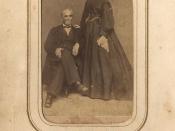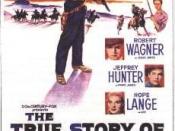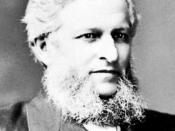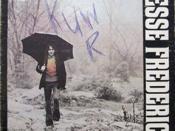Analyzing a story is a funny thing. A story can mean so many different things, as one can tell during any discussion about it. Ideas flow like water, each one with a different interpretation of what the author was trying to get across. Some are simple, some rather obscure, and down-right off the wall, yet given any good sense of argumentative skills, and anyone can defend their point in a way which can't be proven wrong. In fact, when going on about the "deeper meaning" of a certain piece of literature, the only way you could really have a wrong and right is if the author was sitting right next to you saying flat out, "This is what I mean by this passage, and nothing else." However, this is rarely the case.
Such is the dilemma with "Must I Be Carried to the Sky on Flowered Beds of Ease?" As with everything else ever written, from Shakespeare to stereo instructions, it's all subjective to the reader's perception, which in turn is unique as their personality.
I believe the entire theme of the story is summed up with one line of the second paragraph, in which Jesse states, "All my life I've had this trouble holding on to what loves me.", which is more than obviously the running theme to this piece of writing. However, I believe that the catch in this work is about how he loses all that loves him. There are distinct correlations between all subjects of loss in this story, being defined as Jesse's father, Jesse's mother, Ezekiel, Jesse's wife, and both his kids, Bobby and Russell. The trick to these in this is the particular order in which they are written. Would it have the same effect if it was told in such a manor that they talked first about Jesse's father and then his wife, then not even introduce the situation with Russell till the end? Of course not, and the author places the said passages in such an order for a reason.
The best comparison I see between themes of loss is between Jesse's wife, Hazel, and Russell. Unlike the situation with his father, the passage of Hazel's leaving is very short in comparison. This leaves it open to more interpretation. Hazel's leaving is best summarized in the line, "Being alone is hard, Jesse, but not so hard as being alone with you." This runs in direct contrast with Russell's opinion, that being along is much less desirable than being with his father, hence he eagerness to come home to die. Jesse on the same token is more than willing to take care of Russell during a time of need, despite the warnings from Russell about how hard it will be. I think this goes to show that despite what Hazel had said, Jesse hadn't really pushed her away as much as she had left from her own unhappiness with her life. The picture painted by her speech about how much he loves her, and that "enough" isn't really enough., tries to give an image of Jesse, an unloving husband who doesn't seem affected by his wife leaving him for said reason. However, if you look at the order in which the passages are told, his wife's abandonment is delivered before the tale of his father and Ezekiel, and with cause. After painting the image of Jesse as an unfit husband and letting his own wife leave, the flashback provides something of a reason for Jesse's behavior, demeanor, and general attitude towards life.
This puts something else on the table. Hazels leaving implies that there has been a change in Jesse over the years, from the man she married and had children with; to the embittered man she left. After you read the passage involving Jesse as a child, you see that isn't true, and in fact, Jesse had had such a personality since childhood. There was no way Hazel could not have known how he was. She mentions how it had to do with having the children to take care of prior to then, and that the need for that was gone now. This again doesn't make sense, since she must have been with Jesse for at least a short period of time previous to having the children. During that time she was alone with Jesse as well, however it didn't phase her back then. This is why the short passage on Hazel, Jesse's wife, is so open to interpretation, since it otherwise leaves many holes to be filled by the reader.
Now Russell is a prime example of an inverse relationship as Jesse and Hazel. Where as the husband and wife had started out with a somewhat pacific beginning and then one was unable to tolerate the other; Jesse and Russell had a rough start, the put it lightly, and the end up together in the end. Brief insight is given in the past relationship between Russell and his father, without going into too much detail of particular acts of discrepancy (although the author does mention a period of time served in jail by Russell, and alludes to other instances). However, as the story is told from the first-person point of view of Jesse, you can tell that he doesn't wish to dwell on the bad experiences with Russell, but rather since he is at a point in which his son doesn't have much time left to live, he focuses on the good in him. This is the purpose of merely alluding and giving glimpses of Russell's "less-than-credible" past, shown in the paragraph where Jesse reminisces on times in the past in which Russell has gotten drunk and called him. Instead of focusing on Russell calling out of intoxication, the author has Jesse put more mention into to time where they would talk on the phone about the old days, and have a good laugh about it. This does add an element of realism to the story, as one wouldn't me in a mindset concerning the follies of another person's past if they knew they were on their deathbed. It can only make you wonder what the story would sound like if Jesse was telling it a few months or a year earlier, and Russell's illness (or news thereof) hadn't hit in full effect yet. Would Jesse still have a longing tone and at the mention of his son's name would he still get nostalgic and pensive? Probably not. Realistically, Jesse would more than likely react like any other father with a rebellious son, and be somewhat wistful about the whole episode.
The sudden ending to the story also serves a purpose, as do most things in any kind of literature. The ending leaves the reader flipping the page over a few times, wondering if a page fell out or were stuck together. This is because the piece itself is more of a testimony of Jesse on a particularly meaningful day in his life, rather than Jesse regaling us with tales of his family and youth. Much like the testimony of a witness on the stand in court, there is no definitive beginning or ending, just a glimpse at an occurrence someone is remembering. Just as in a courtroom it would seem out of place for a witness to end their testimony with "and such is life, which can be a harsh and demanding mistress, we must all learn from our experiences and move on⦠the end", it would seem just as out of place for Jesse to end his tale in such a manor. The ending itself also coincides with Jesse's personality and style throughout the story, as well as Jesse's life as a whole. No frills, just a beginning, something in the middle, and an end. As the theme of love and loss is prevalent throughout this piece of writing, the last paragraph of this story sums it up the best; there is no ending, just an end.





